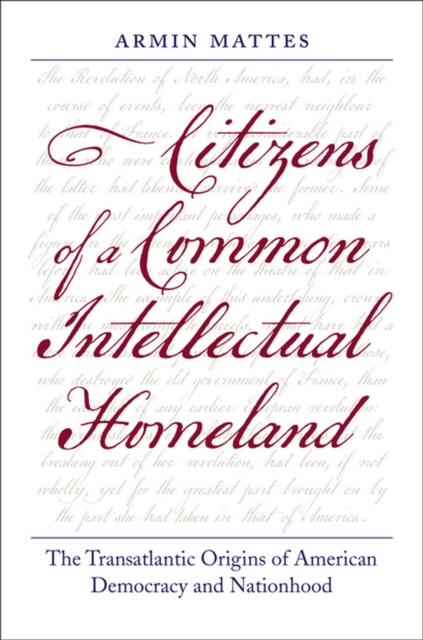Citizens of a Common Intellectual Homeland: The Transatlantic Origins of American Democracy and Nationhood

Citizens of a Common Intellectual Homeland: The Transatlantic Origins of American Democracy and Nationhood
Notions of democracy and nationhood constitute the pivotal legacy of the American Revolution, but to understand their development one must move beyond a purely American context. Citizens of a Common Intellectual Homeland explores the simultaneous emergence of modern concepts of democracy and the nation on both sides of the Atlantic during the age of revolutions. Armin Mattes argues that in their origin the two concepts were indistinguishable because they arose from a common revolutionary impulse directed against the prevailing hierarchical political and social order. The author shows how the reconceptualization of democracy and the nation, which resulted from this revolutionary impulse, received its decisive form from the French Revolution. Although the French Revolution was instrumental in redefining the two terms, however, neither were these changes confined to France, nor did the new meanings merely radiate from France to other countries.
To illustrate the transatlantic emergence of these ideas, Mattes considers the works of pairs of prominent intellectual contemporaries--one in America and the other in Europe--each writing on a common topic. The thinkers and topics include Thomas Paine and Edmund Burke on the transatlantic revolutions, John Adams and Friedrich von Gentz on the mixed constitution, James Madison and Immanuel Kant on perpetual peace, and Thomas Jefferson and Destutt de Tracy on the nation. Mattes's approach highlights the significant impact that the French Revolution had on the evolution of thought in the period, demonstrating that the emergence and early development of modern concepts of democracy and the nation in America were intimately tied to revolutionary events and processes in the larger Atlantic world.
Preparation of this volume has been supported by the Thomas Jefferson Foundation.
Jeffersonian America
PRP: 279.00 Lei
Acesta este Prețul Recomandat de Producător. Prețul de vânzare al produsului este afișat mai jos.
223.20Lei
223.20Lei
279.00 LeiLivrare in 2-4 saptamani
Descrierea produsului
Notions of democracy and nationhood constitute the pivotal legacy of the American Revolution, but to understand their development one must move beyond a purely American context. Citizens of a Common Intellectual Homeland explores the simultaneous emergence of modern concepts of democracy and the nation on both sides of the Atlantic during the age of revolutions. Armin Mattes argues that in their origin the two concepts were indistinguishable because they arose from a common revolutionary impulse directed against the prevailing hierarchical political and social order. The author shows how the reconceptualization of democracy and the nation, which resulted from this revolutionary impulse, received its decisive form from the French Revolution. Although the French Revolution was instrumental in redefining the two terms, however, neither were these changes confined to France, nor did the new meanings merely radiate from France to other countries.
To illustrate the transatlantic emergence of these ideas, Mattes considers the works of pairs of prominent intellectual contemporaries--one in America and the other in Europe--each writing on a common topic. The thinkers and topics include Thomas Paine and Edmund Burke on the transatlantic revolutions, John Adams and Friedrich von Gentz on the mixed constitution, James Madison and Immanuel Kant on perpetual peace, and Thomas Jefferson and Destutt de Tracy on the nation. Mattes's approach highlights the significant impact that the French Revolution had on the evolution of thought in the period, demonstrating that the emergence and early development of modern concepts of democracy and the nation in America were intimately tied to revolutionary events and processes in the larger Atlantic world.
Preparation of this volume has been supported by the Thomas Jefferson Foundation.
Jeffersonian America
Detaliile produsului










